Lessons of life from my father

Prem Prakash Sharma (popularly known as PP) was born in Sikar, Rajasthan in 1959. He graduated in B.Sc. (PCM) from Government College, Neem ka Thana, Rajasthan. He went on to finish his education with a three-year law degree and masters in political science from University of Rajasthan.
PP joined Customs and Central Excise and was posted to several cities, international airports and sea ports across India in a career spanning 36 plus years.
PP retired on superannuation from Jaipur in January 2019 where he lives with his elderly parents, families of two brothers, his wife Sadhana, son Vivek and daughter Niharika. Both his children are excelling at their studies.
PP is a keen follower of cricket played the around the world, having himself played competitive games at various levels. His favourite pastime post-retirement is to look after his family, play golf and listen to some soul-searching music.
Editor's Note: This is the third part of PP's memories about his childhood. The first part can be read here: A Journey of Our Days and the second here: The visit of a VIP to a small town.
The whims of a bureaucrat are sometimes manageable or the damage may be controlled with the help of other right-thinking senior officers, but the interference in bureaucratic affairs by politicians can play havoc in the career of any government servant.
Here is an account of the real incident that took place with my father, Mr. Ramesh Chand Sharma (‘RCS’). I came to know of these incidents from him and others, and also witnessed the after-effects of such “interference” on the family of a harassed government employee.
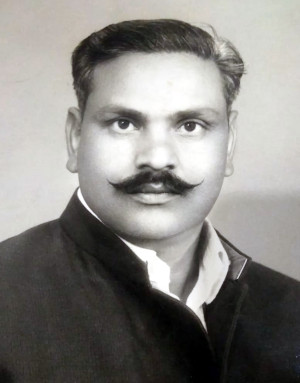
Shri Ramesh Chand Sharma (‘RCS’) photographed in 1968-69.
RCS was employed as Inspector (Group C) of the co-operative societies, with the Rajasthan State Government from 1963. He was posted at Sikar (a district headquarters in Rajasthan) on deputation in Land Development Bank engaged in providing soft loans to farmers.
He was the sole bread-earner for a family of six, with the responsibilities to look after his old mother and two younger brothers who lived in a village in the same district.
RCS was known as a diligent worker in his office. As a child, I saw him working from home with his subordinate staff on holidays as well, and during his time, the Sikar district branch of the Bank had an outstanding performance.
The official position of RCS was not of serious political consideration for the local Member of Legislative Assembly (‘MLA’), but somehow his ego was hurt as RCS could not act according to the MLA’s recommendations. This was despite the fact that the MLA’s relative was given temporary employment by RCS in his office.
RCS enjoyed good reputation as an officer in his Department. In the beginning of the year 1968, he was offered transfer to another place, particularly in view of the MLA’s annoyance, but he did not choose to go far from his home district as he did not take the situation seriously. However, he could not have imagined the aftermath of this decision.
As he refused the transfer, the MLA then made minor false allegations against RCS to the senior officers of the Department. Subsequently, a brief inspection of RCS’s office was conducted by a senior officer around middle of the year 1968.
I was nine years old at that time, a student of 5th standard. My mother told me that RCS would soon be transferred to some other town. I was shocked to hear this as I loved my school very much and the thought of leaving my school and friends was quite unpleasant for me.
However, to our utter surprise, instead of a transfer, RCS got the order of suspension from government service with effect from 1st September 1968, shifting his headquarters to the office of Registrar of Co-operative Societies, at Jaipur.
RCS took the suspension lightly and was least disturbed as he was sure that he had done no wrong and the matter would be sorted out quickly. He shifted his family from Sikar to his native village in the first week of September 1968, as he could not afford to settle them in Jaipur.
Due to the above circumstances, my younger sister and I had to switch from a private school at Sikar to the government school in our native village.
I still remember my first day at the government school. The white and blue uniform and classrooms with chair and table were left behind, replaced by khaki uniform and sitting on bare ground in typically smelly classrooms.
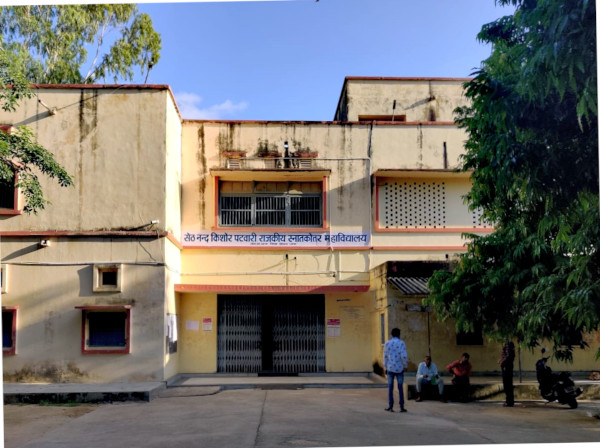
The government school in Neem Ka Thana.
My new school, unlike the previous one, started English education only from the 6th standard. At that moment, I could not have known the possible impact that this change would have on me later on. The incident shaped me in such a way that an innocent child in the tenth year of his life morphed into an insecure but observant boy.
From the next session, my sister was sent to my maternal grandparents’ place for further education as the environment of the village was adverse for girls’ education.
I observed that the suspension from government service was not bothering RCS much. I also heard this from the other family members/relatives. He was under the impression that it was a transient phase, which was not going to last long. The charge-sheet was also issued much after the due date.
For the family’s sustenance, RCS had a small agricultural set up in the village.
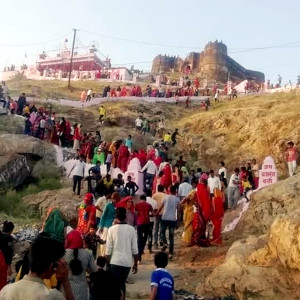
Village Neem Ka Thana in Sirohi district, Rajasthan.
RCS was a teetotaller and a God fearing person. RCS never cared to strike a compromise with the MLA and ignored the advice of a neighbouring politician from the same political party. After a period of one or two years, RCS was served a charge-sheet on flimsy grounds by the Department. He replied to the charges in detail and expected due consideration by the Department.
However, it appears that in State Government, things move slowly. Even while RCS’s reply to the charge-sheet was under consideration, a case of fraudulently obtaining loan from the Bank came to light, wherein RCS could be a vital witness for prosecution. The brief facts of this case were that a farmer had applied for a loan of Rs. 20,000 for purchasing a tractor, mortgaging a land which was in the name of his father as per the land revenue records. But, the farmer impersonated his father who had already expired, and he produced copies of all the records along with the village patwari, sarpanch, and a local school teacher as witnesses to identify him as the owner of the land.
The loan was granted directly to the firm that sold the tractor to the farmer after processing and recommending of the application by RCS and other officers on the basis of land revenue records and the identification made by the witnesses. Finally, the loan was sanctioned by the Registrar of co-operative Societies, Jaipur.
Subsequently, the farmer who had taken the loan died and his sons refused to repay the loan. The Bank lodged an FIR with the police against the farmer and the witnesses. But, due to unfortunate persuasion by the MLA, RCS and one other officer were also made accused in this case and they were charged for conspiring with the other accused persons for providing fraudulent loan.
This additional charge was also replied to confidently by RCS, denying any involvement. But, the wait for court’s decision in the matter suited the disciplinary authority. As per usual practice, the criminal trial continued for several years in the court of Sikar District. The Department had forgotten the two employees, who were drawing a meagre sustenance allowance.
As usual, the judiciary was also not in haste to decide the case. RCS patiently went on supporting a joint family of three brothers with the help of minor agricultural setup and small incomes from professions of two younger brothers.
He also tried out the business of dairy farming, but suffered heavy losses causing him diabetes and hypertension from the year 1978, when he was only 42 years old. The healthy man who was jolly and confident enough, bore with the diseases with a hint of humour, without showing any signs of distress and depression.
In the year 1978, I passed out B.Sc. final year from the government college at the nearby town, Neem ka Thana. I graduated with average marks, owing to the other time consuming activities I was involved in, such as NCC, cricket, and other sports.
From the career’s perspective, the ongoing legal proceedings against RCS prompted me to go for a degree in law. This option also seemed easy in comparison to the other choices, keeping in mind the limited financial resources available to my family. Hardly any career guidance was available in that era in the rural areas for average students.
Accordingly, after graduation, I took admission in the LL.B. course at the Rajasthan University Campus (Jaipur).
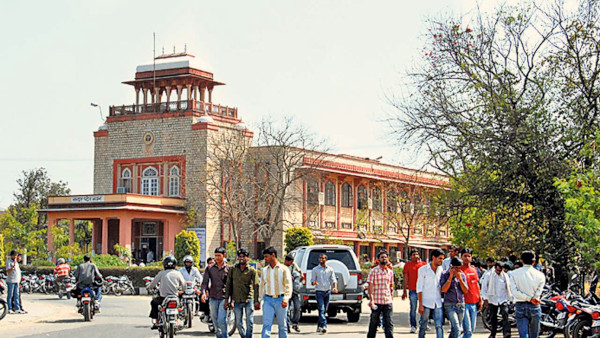
The administrative block of the University of Rajasthan.
However, in my spare time, I started preparation for competitive examinations for government jobs, as I came to know that the practice of law in courts was not a financially encouraging career choice.
Having RCS’s case in mind, the service of State Government was not a preference for me. The three year degree course of law was stretched to fourth year, ending in 1982, as the academic sessions were delayed. This also resulted in loss of interest in legal profession.
With Civil Services Examination conducted by UPSC in mind, I decided to pursue M.A. in Political Science, with Law and Political Science as my optional subjects. I cleared the preliminary examination easily, but the main examination was an entirely different story. I could not score well in the optional subjects. I was crossing 23 years of age at that time, and my siblings were also pursuing education.
In these circumstances, the job of an Inspector in the Central Excise and Customs Department at Jaipur became an acceptable option, especially as this job was believed to be free from political interference. Being a law graduate, it was easy for me to get posted in the Law and Prosecution branches at Jaipur for the initial years of my service (from 1983 to 1985).
After I began my job, the entire family shifted to Jaipur. My younger brother got admission in Malviya Regional Engineering College, Jaipur (now, MNIT). The other two younger brothers as well as my sister were also pursuing college education at that time.
While working in the Prosecution branch for nearly three years, I obtained practical knowledge about the working of the judicial system, and simultaneously started preparing for the final stage ofRCS’s case with the help of a good lawyer.
The case reached to its final stage in September 1987, after a protracted trial of nearly seventeen years. On the day of the judgment, I was also present in the court-room besides both my uncles. RCS was in the box with the other accused.
Our advocate was quite confident about acquittal as there was not an iota of evidence against RCS. But, the unpredictability of our judicial system raised our heartbeats as the announcement of the judgment came closer.
On the fateful hot and humid day, the court room was swarming with local advocates who were also eager to hear the verdict in this very old case. The ADJ pronounced the judgment around 4 PM and he read over the concluding part in the open court in a very informal manner.
RCS was acquitted from all charges along with another government servant, and the judge convicted the other four accused in the case.
RCS heaved a great sigh of relief, and both my uncles could not hide their tears. The moment when the verdict was pronounced has still not faded from my memory. RCS thanked God and took me to visit some of his old colleagues the same evening to share the good news of his acquittal.
After the appeal period lapsed, RCS requested his Department to reinstate him in view of his acquittal by the court. The Department had almost forgotten about him, except for monthly salary accounts.
Upon his request, the Department came out of its slumber and examined the verdict. The easiest course of action for the Department was to file an appeal before the High Court and sleep on the matter again for years. However, the legal examination process did not find sufficient grounds for appeal against the judgment after such an inexplicable delay.
Thus, finally, the verdict was accepted by the Department, but a question on note sheet was raised about the decision on the first charge-sheet. The Department’s records were not handy, so RCS provided copies of the charge-sheet and replies to the same, with an expectation of quick decision by the authorities.
On persistent requests, the Department reinstated RCS in service in 1987, after about nineteen years of suspension, pending Departmental Enquiry about the remaining charges. He was posted at Alwar. On joining, his old colleagues could not recognise him at once, as he had lost his youth, teeth, and good looks in this struggle of nineteen years.
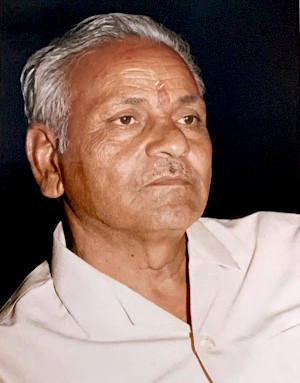
Shri Ramesh Chand Sharma (‘RCS’) photographed in 1992-93.
During his second stint in the Department, RCS was praised by his seniors and colleagues for his work, particularly in view of being out of the Department for such a long period and having faced a protracted criminal trial in court.
In 1988, on annual general transfers, RCS requested for transfer from Alwar to Jaipur as his family was settled there and his impending social obligations required his presence there. He never begged for any undue favour, but only requested for fair treatment.
His application for transfer was submitted with due recommendation to the Minister for final approval, as per the practice in all State Government Departments. However, RCS’s tryst with destiny was far from over. Coincidentally,and unfortunately for RCS, the MLA from the incident in 1968 had then become the Minister for the Co-operative Societies Department.
Learning that RCS was back in service, the Minister ordered that he should be posted in the farthest district from Jaipur. The senior officers, although sympathetic to RCS, could not help him and RCS was ordered to be transferred to Banswara with unofficial advice to serve there until further opportunity of change.
His health started deteriorating, so he preferred proceeding on leave rather than working at Banswara. He joined his service back at Jaipur after a leave of nine months as the State Government changed in 1988-89 and the new Minister did not have any bias against RCS.
In the same year, he arranged for the marriage of my younger sister, who had crossed twenty seven years of age. In view of my family’s situation, even after five years of service, I decided to marry at a later point of time, after my younger brothers had completed their education.
The action in respect of the first charge-sheet was still pending. After joining at Jaipur, RCS reminded the administration for payment of arrears of salary for the past period and for re-fixation of pay as per current scales. It is beyond my comprehension how the authorities can ignore reasonable requests of employees for indefinite time.
Although his seniors and colleagues personally liked RCS, the authorities did not take any initiative. In view of the Department’s inertia, I suggested RCS to approach the High Court through writ proceedings with the help of a friend of mine who was a practicing lawyer at the High Court, Jaipur.
Once the High Court notice was served, the authorities again woke up to take a decision on a matter that they had left pending for far so long. They submitted vague replies, such as ‘enquiry is pending’.
After going through all the facts of the case and lapse of so much time after issuing the charge-sheet, the High Court blasted the standing counsel asking the Department to complete the enquiry within three months from the date of the order and take a decision on merits without any further delay.
The High Court’s order was lying under red tape for the next four-five months. RCS again reminded the Department about the order, but it seemed like there was not any system of accountability of affairs in the Department.
We had to approach the High Court once again, seeking action for compliance of the order by the Department. The High Court observed that enough was enough and that there should be a limit to the time period taken by public authorities. The Hon’ble Court clearly ordered that all the monetary arrears owed to RCS should be paid by the Department in the time of three months (by March 31) along with penal interest @15% per annum. This order came in the year 1992, addressing the struggles endured by RCS since 1968.
It was another difficult task for the Department to prepare a bill of arrears of salary for such a long period. The Department, however, eventually paid all the arrears with penal interest in the year 1992, finally bringing an end to the legal battle, when RCS was left with less than three years of service before his retirement. By this time, I had completed ten years of service and decided to marry.
On superannuation, RCS retired from service on 31 March, 1995 with a warm send-off from his colleagues and the Department. All the monetary benefits pending from the period of suspension were restored to him, but there is no compensation for the mental agony, loss of prestige in society, and consequential damage to the prospects of progress of a family. There is no punishment for the politicians for their wrong doings in the system except the divine justice.
Today, RCS, at eighty four years of age, is a contended man having discharged all his social responsibilities, living peacefully with me along with all other members in a joint family in Jaipur. He has taught all of us that if our conduct is right, ultimately the truth will prevail and no one can harm us.
I have also followed this lesson during my service, and have retired from the post of Assistant Commissioner (CGST and Customs Department) in January 2019.
Comments
Kudos PP.You have
Kudos PP.You have beautifically sketched out the predicament of honest civil servant.Justice delayed is justice denied has no never been described better
It's hard to be honest
That's a fantastic account of your family. Hope you and the next generation will be free of such terrrible behaviour, and will actually benefit from RCS's shining example.
reply
It has happened with us but being the elder most, it is the most felt and digested by You. What we can say that it was an accident, without fault of ours, and we came out through the turbulent period safely. One good thing happened in due course of time that the family remained intact- a joint family despite acute shortage of money. We never let ourselves down in society. Only God knows where we would have landed if above real story had not happened.
Our political system undoubtedly needs reforms, bureaucracy also follows politicians and some are inefficient, incapable officers. However what has happened should not have happened and God save others. Excellent compilation.
Add new comment